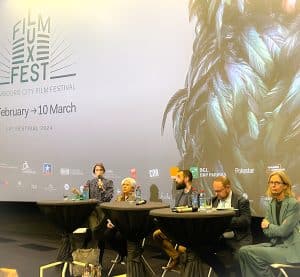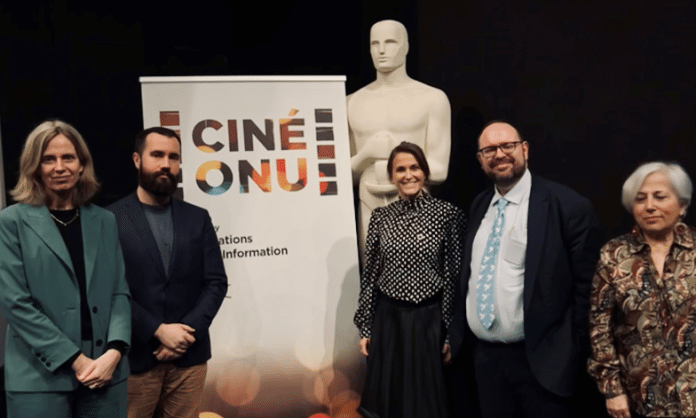As part of the Luxembourg City Film Festival, the UN Regional Information Centre (UNRIC) organised its annual Ciné-ONU in Luxembourg with the screening of the Oscar-winning documentary “20 Days in Mariupol” by Ukrainian videographer, journalist and war correspondent Mstyslav Chernov.
The film drew a captivated audience, including many Ukrainian refugees living in Luxembourg as well as the Honorary Consul of Ukraine in Luxembourg, Claude Radoux, and the U.S. Ambassador to Luxembourg, Thomas Barrett.
War in Ukraine must stop
On the eve of Russia’s 2022 invasion of Ukraine, a team of Ukrainian Associated Press journalists entered the port city of Mariupol. For three weeks, they documented a city under attack.

The documentary depicts a vivid, raw account of civilians caught in the war in Ukraine, as well as a view on what it is like to report from a conflict zone, and the impact of such reporting globally.
Since this film was shot, the war has caused destruction, displaced millions, traumatised a generation of children, torn families and communities apart, devastated the economy, and turned vast areas of farmland and forests into deadly minefields. More than 30,000 civilian casualties, including over 10,500 deaths, have been recorded, according to the UN human rights office OHCHR. These are only the figures confirmed by the UN. The actual toll is likely to be higher.
Through this film screening, taking place two years since Russia’s full-scale invasion of Ukraine, the Ciné-ONU platform amplified the UN Secretary-General’s voice that the war must end now, in line with the UN Charter, international law and resolutions of the UN General Assembly.
The fight for human rights and correct information
The film is also a stark reminder of the importance of correct information and press freedom, or to quote the film’s director Mstyslav Chernov: “this film gives you enough context to make your own informed decisions (…) and how to interpret the images and not to be told how to interpret them”.

The screening was followed by a panel discussion on mis- and disinformation, human rights and press freedom, with Anne Goedert, Ambassador for human rights at the Luxembourg Ministry of Foreign and European Affairs; Guilherme Canela de Sousa, UNESCO’s Section Chief of Freedom of Expression and Safety of Journalists; Rosa Brignone, President of the NGO Time for Equality; Misch Pautsch, journalist at Lëtzebuerger Journal; and moderated by Marian Blondeel, Head of UNRIC’s Benelux and EU Desk.
Sharing his thoughts on the documentary, UNESCO’s Guilherme Canela de Sousa said: “this film shows a sense of duty. Freedom of expression is a collective right. Without freedom of expression, all other human rights are impacted.”
“This film shows that, without human rights, impunity becomes a mechanism to destroy,” Time for Equality’s Rosa Brignone added.
Following several impactful testimonies from Ukrainians in the audience, Ambassador Anne Goedert concluded the screening saying: “we will never forget this film and the suffering of people in Ukraine.”
This annual Ciné-ONU in Luxembourg screening is possible thanks to the cooperation with the Luxembourg City Film Festival.
More information

